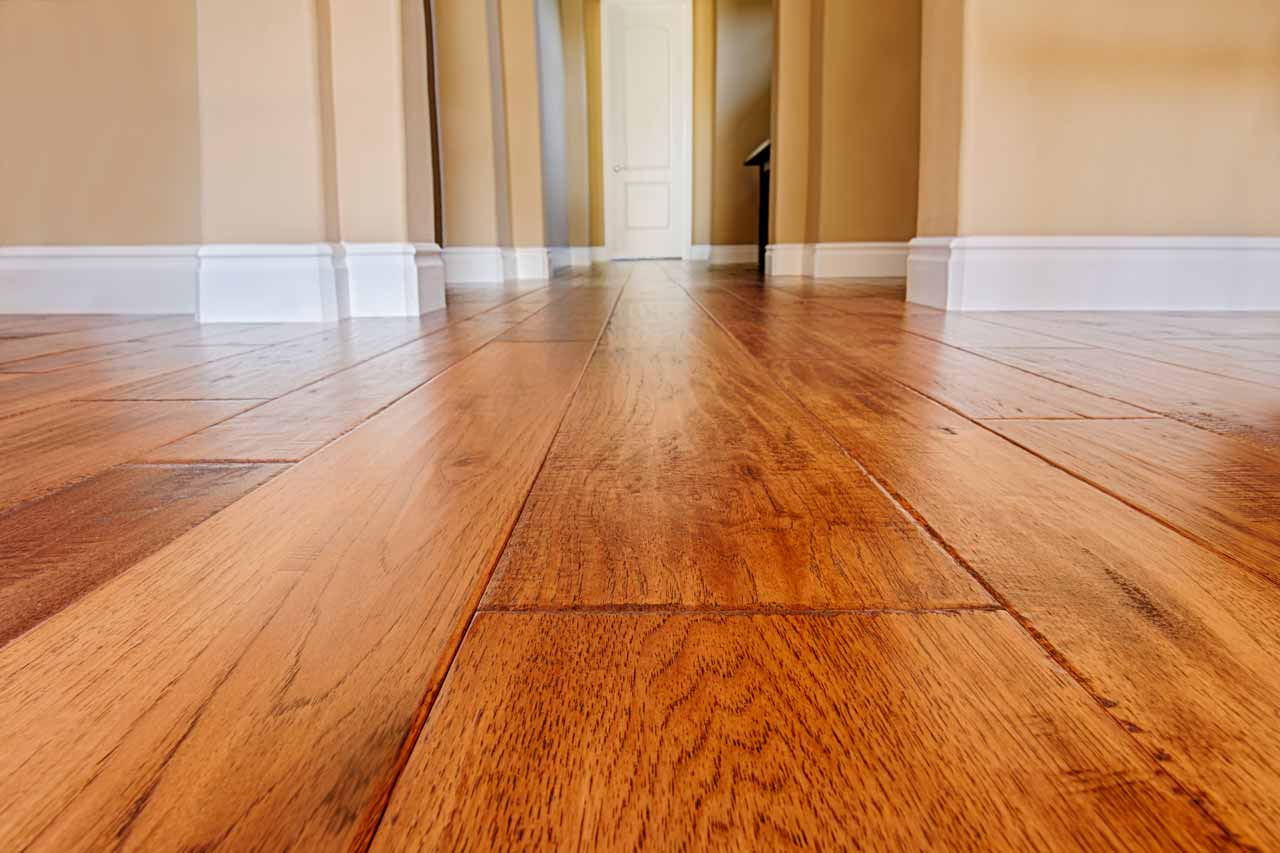

Left/Top: Photo: Samiylenko / Adobe Stock
Bottom/Right: Photo: Samiylenko / Adobe Stock
When it comes to carpet versus hardwood, both are popular flooring options, but each offers various advantages and disadvantages. For instance, carpet is better at muffling sound, while hardwood is easier to clean and has a longer life span. Use this guide to weigh the pros and cons of each so you can find the perfect flooring type for your household.
On This Page:
- What Is Carpet?
- What Is Hardwood?
- Appearance
- Cost
- Upkeep
- Durability
- Installation
- Life Span
- Environmental Impact
- Resale Value
- Moisture Resistance
- Pets and Allergies
- Is Hardwood or Carpet Better for Your Home?
- Hardwood and Carpet vs. Laminate
What Is Carpet?
Carpet comes in a wide variety of colors, styles, textures, and thicknesses. It’s a good insulator and does a better job than hardwood at muffling sounds. It also costs much less than hardwood but has a shorter life span and is trickier to clean.
What Is Hardwood?
Hardwood comes in many different species and styles that can suit various budgets and aesthetic leanings. Like carpet, it’s also a good insulator, but it’s not as good at muffling sounds. However, it can last for a lifetime when properly maintained and relatively easy to clean.
Appearance
Carpet and hardwood each have a very different look and feel. The right option for you depends on your unique style sensibility.
| Carpet | Hardwood |
|---|---|
| Comes in various textures and thicknesses, from coarse and thin to soft and thick | Natural texture with unique grain patterns |
| Comes in many different colors, patterns, and styles | Can take on different stains and finishes |
| Vulnerable to stains | Vulnerable to scratches and discoloration |
Carpet
Carpet comes in nearly infinite colors, styles, patterns, and textures, so it’s a great option if you’re looking for a particular hue or pattern to match the rest of your aesthetic. However, it’s more prone to staining than hardwood and tougher to clean.
Hardwood
Hardwood flooring offers a warm, natural texture and unique grain patterns that ensure every hardwood floor is one of a kind. However, hardwood is vulnerable to scratches and can fade or discolor with prolonged sun exposure.
Cost
Hardwood versus carpet costs vary quite a bit. The cost of carpeting is generally the more budget-friendly choice compared to hardwood. However, they can be comparable in price depending on the wood species or carpet style you choose.
Carpet
Carpet can cost as little as $1 to $2 per square foot or as much as $9 to $11 per square foot, depending on the type you choose. For an average 12 feet by 12 feet space, you could pay anywhere from $150 to $1,500 for the material alone.
| Carpet Fiber Type | Average Cost Range per Sq. Ft. | Description |
|---|---|---|
| Polyester | $0.25 – $4.50 | Stain-resistant but not very durable |
| Nylon | $1 – $6.50 | Popular and durable but not very stain-resistant |
| Olefin | $1.50 – $2.25 | Durable, moisture- and stain-resistant, sensitive to high heat |
| Wool | $4.50 – $10 | Natural fiber, stain-resistant, and easy to clean |
| Carpet Pile | Average Cost Range per Sq. Ft. | Description |
|---|---|---|
| Cut pile textured | $0.75 – $2 | Soft, two-toned, and stain-resistant |
| Cut pile frieze | $1 – $4 | Twisted pile that hides imprints well |
| Cut and loop | $1 – $6 | Incorporates cut and loop pile and conceals dirt |
| Multilevel loop | $1.30 – $4 | Conceals dirt but pet paws can get caught in loops |
| Level loop | $1.50 – $8.50 | Pet paws can get stuck in loops |
| Cut pile saxony | $2 – $7 | Smooth, twisted pile that hides imprints well |
| Cut pile plush | $3.50 – $4.50 | Soft and smooth but easily shows imprints |
Hardwood
Hardwood varies in price quite a bit depending on the species you choose, typically ranging from $3 to $14 per square foot. For an average 12 by 12 feet space, expect to pay anywhere from $450 to $2,000, not including installation.
| Wood Species | Average Cost Range per Sq. Ft. | Description |
|---|---|---|
| Bamboo | $2 – $4 | Not a true hardwood but equally hard; moisture-resistant and eco-friendly |
| Hickory | $3 – $6 | Very hard and durable |
| Cork | $3 – $8 | Durable, eco-friendly, and soft but not moisture-resistant |
| Maple | $3.50 – $6 | Very durable and stain-resistant |
| Pine | $3.50 – $7 | Less durable; considered a softwood |
| Brazilian cherry | $4 – $9 | Also called Jatoba; very hard with a burgundy tint |
| Oak | $4.50 – $7 | Very durable and features a dark grain |
| Ash | $5 – $9 | Very hard and durable with a light color |
| Brazilian walnut | $5 – $9 | Also called Ipe; very hard and durable with a darker hue |
Upkeep
Hardwood is typically easier to maintain than carpet, but it’s more expensive to repair. In general, floor repairs cost around $200 to $500. The cost of carpet repairs ranges from $75 to $450, while the price to repair hardwood flooring ranges from $150 to $2,600.
| Carpet | Hardwood |
|---|---|
| Harder to clean and less stain-resistant | Easy to clean with broom or vacuum |
| Needs a deep cleaning every few years | Can refinish it when damaged or scratched |
| Relatively affordable repairs compared to hardwood but often needs to be replaced rather than repaired | Can’t be mopped with excessive water |
| Some damage can’t be repaired | Too much sun exposure can cause fading and discoloration |
Carpet
Carpet traps dirt and debris more than hardwood and is tougher to clean, so busy households or those with pets and kids might prefer hardwood. Carpet also usually needs to be deep cleaned every few years. Professional carpet cleaning costs $130 to $230 on average.
Hardwood
Hardwood is typically lower maintenance and easier to clean compared to carpet. It’s also more stain-resistant and won’t trap dirt and debris the way carpet often does. You can fix scratches and other damage without replacing the floor. However, certain species can fade with too much sun exposure.
Durability
If you’re looking for the longest-term investment and you’re not interested in replacing your flooring within the next 15 years, hardwood is a better choice than carpet.
| Carpet | Hardwood |
|---|---|
| Less durable | More durable |
| Lasts for 5 – 15 years | Lasts for 30 – 100+ years |
| More vulnerable to stains | More vulnerable to moisture damage |
Carpet
Carpet isn’t known for its durability. Depending on the foot traffic in your household, expect to replace your carpet every five to 15 years. Carpet is also less stain-resistant than hardwood, and when it starts to deteriorate, you typically need to replace the whole carpet, unlike hardwood, which can be resanded and refinished.
Hardwood
Hardwood is much more durable than carpet. Not only is it more stain-resistant, but it also lasts much longer. In fact, well-maintained hardwood can last a lifetime. And when it does incur damage, you can refinish it rather than replace the whole floor. However, hardwood can warp with too much moisture, so clean up spills as soon as they happen.
Installation
If you’re considering installing carpet or hardwood yourself, consider several factors. Keep in mind that carpet is generally easier to install than hardwood.
| Carpet | Hardwood |
|---|---|
| Simpler to install than hardwood | Installation requires more expensive tools than carpet |
| Can be difficult if working with multiple rooms, poor subfloor conditions, or oddly shaped spaces | More complex installation |
| Less expensive tools required for installation | Tongue-and-groove hardwood planks make DIY installation easier |
Carpet
Carpet is typically easier to install than hardwood and doesn’t require very expensive tools. But installation is more complicated if your subfloor is in poor condition or you’re working with an oddly shaped room or space.
Hardwood
Hardwood flooring is more complex to install than carpet and requires more expensive specialized tools. However, choosing tongue-and-groove hardwood planks can make installation easier. You can also choose prefinished hardwood flooring over unfinished to reduce your installation time.
Life Span
When it comes to life span, there’s a clear winner: Hardwood lasts much longer than carpet.
| Carpet | Hardwood |
|---|---|
| 5 – 15 years | 30 – 100 years |
Carpet
Carpet typically has a life span of five to 15 years. If you live in a busy household with lots of foot traffic, kids, or pets, expect to replace your carpet closer to five years than 15. Additionally, once the carpet deteriorates, you typically need to replace the whole thing.
Hardwood
Hardwood flooring can last 30 to 100 years or more, depending on the species and how well it’s maintained. Plus, once hardwood starts to deteriorate, you can resand and refinish it to restore its appearance rather than replace the whole floor.
Environmental Impact
Growing options for renewable and sustainable remodeling materials help make our homes more environmentally friendly. If sustainability is your main priority, hardwood is the clear choice.
| Carpet | Hardwood |
|---|---|
| Not eco-friendly but wool offers more sustainability than other carpet materials | More eco-friendly than carpet |
| Can release harmful volatile organic compounds when it breaks down | Biodegradable |
Carpet
Carpet is usually made from petroleum and isn’t considered environmentally friendly. In fact, as it breaks down, it can release volatile organic compounds, which are potentially hazardous to your health. However, wool is a natural fiber option that’s more sustainable than other carpet types.
Hardwood
You won’t find many flooring options that are more eco-friendly than hardwood, especially when it’s sourced sustainably. Hardwood is a natural material that’s both biodegradable and recyclable, so it won’t contribute to landfill overflow. The most sustainable hardwood flooring holds Forest Stewardship Council certification, so look for that when purchasing.
Still have questions about carpet installation?Resale Value
If you’re planning to sell your home within the next 10 years, resale value can play a big role in your decision. In general, hardwood offers better resale value, especially when compared to older carpet.
| Carpet | Hardwood |
|---|---|
| Lower resale value | Higher resale value |
| Shorter life span and less durability make carpet less of a draw for potential homebuyers | 21% of realtors advise homeowners to install hardwood floors before selling their home |
Carpet
Carpet hasn’t lost favor with homebuyers, but most homebuyers prefer hardwood. New carpet or hardwood floor installations might offer comparable resale value, but homes with old carpet can suffer in the market.
Hardwood
According to the National Association of Realtors, 21% of realtors advise their clients to get hardwood flooring before selling their homes. The report also estimates that this project has a 91% return on investment.
Moisture Resistance
Both hardwood and carpet can resist moisture, but carpet tends to be better at it. Hardwood can also warp with too much moisture.
| Carpet | Hardwood |
|---|---|
| More moisture-resistant | Less moisture-resistant |
| Fibers can grow mold if spills are left too long | Can grow mold if exposed to constant moisture |
| Some fibers are more moisture-resistant than others | Untreated wood more likely to get moisture damage |
Carpet
Carpet is more moisture-resistant than hardwood but can still grow mold if you don’t wipe up spills quickly. Some carpet types are more moisture-resistant than others, so look at the moisture resistance of each prospective carpet type if that’s a priority for you.
Hardwood
Hardwood flooring isn’t as moisture-resistant as carpet. It also requires regular resealing to prevent moisture damage. But even when sealed, you shouldn’t mop this flooring type with excessive water since water can cause it to warp. If you’re worried about moisture, opt for a denser wood species, which is more moisture-resistant.
Pets and Allergies
If you have pets at home, you probably think of them as you peruse your options. Typically, hardwood floors make life easier for pet owners compared to carpet. Some flooring types can even help keep allergies at bay. If you or someone in your home suffers from allergies, you might prefer hardwood over carpet.
| Carpet | Hardwood |
|---|---|
| More traction for pets than hardwood | Less traction for pets than carpet |
| Waste can soak into carpet, resulting in pet odors | Spilled water bowls can lead to moisture damage |
| Harder to clean than hardwood | Easier to clean than carpet |
| Traps dust, dander, and mildew | Doesn’t trap allergens |
| Harder to clean | Easier to clean |
Carpet
You won’t have to worry about scratches in your carpet, but pet waste, fur, and other debris tend to get trapped in carpet fibers. Low-pile carpet can help minimize this problem, but even low-pile options won’t be as good at resisting pet debris as hardwood. You’ll also want to replace your carpet sooner if you have pets in your household, likely every three to five years.
Keep in mind that carpet isn’t ideal for anyone with allergies. The fibers trap dust, mildew, and pet dander, and cleaning carpet is more difficult than hardwood.
Hardwood
Hardwood is easier to clean and won’t trap pet waste as much as a carpet, so pet owners generally favor it. However, it’s more slippery for pets’ little feet, and their toenails can potentially scratch the wood. Fortunately, minor hardwood scratches are relatively easy to repair.
Also, hardwood is the best choice for anyone worried about allergies. It won’t trap allergens like dust, dander, and mildew, the way carpet will, and it’s much easier to clean.
Is Hardwood or Carpet Better for Your Home?
There are pros and cons to both hardwood and carpet. The right flooring type depends on your budget, lifestyle, and aesthetic preferences.
| Factors | Carpet | Hardwood |
|---|---|---|
| Appearance | More textural look | More organic look |
| Cost | $1 – $11 per sq. ft. | $3 – $14 per sq. ft. |
| Upkeep | Harder to clean and repair | Easy to clean and repair |
| Durability | Less durable | Highly durable |
| Installation | Relatively simple installation | Complex installation |
| Life Span | 5 – 15 years | 30 – 100 or more years |
| Environmental Impact | Not sustainable | Eco-friendly |
| Resale Value | Lower resale value | Higher resale value |
| Moisture Resistance | More moisture-resistant | Less moisture-resistant |
| Pets and Allergies | Traps allergens | Ideal for pets and allergy sufferers |
Bedrooms
Carpet is a popular choice for bedrooms because it’s softer and cozier than hardwood. It’s also better at reducing noise, so it’s particularly helpful in upstairs bedrooms or apartments that aren’t on the first floor.
Living and Family Rooms
Hardwood is a good choice for living rooms and family rooms partly because it’s easy to clean, a great trait for some of the busiest rooms in the home. Plus, these are the rooms that many buyers prioritize, so having hardwood in popular rooms can increase your resale value.
Hallways and Stairs
Hallways and stairs benefit from either option. Hardwood is nice because high-traffic thruways benefit from a durable, low-maintenance flooring. However, carpet muffles high-traffic sounds and makes for a safer stairway. You may want to consider a runner to increase safety if you have hardwood stairs.
Basements
Carpet is a good basement flooring option because it’s a natural insulator. However, some fiber materials perform better in basements than others, so take care to choose the right carpeting for your basement. You or your professional should also prep the subfloor to minimize moisture.
Kitchens and Bathrooms
Carpet doesn’t fare well in bathrooms or kitchens since it traps moisture, dirt, and spills and is tougher to clean than hardwood. However, hardwood doesn’t do well in bathrooms either because it’s so responsive to moisture. You can install hardwood in the kitchen, but it must have a sealant that protects it against moisture.
Carpet and Hardwood vs. Laminate Floors
The cost to install laminate flooring averages $2,750 compared to hardwood’s average of $4,400 and carpet’s average of $1,600. Laminate is more DIY-friendly and moisture-resistant than both wood and carpet, so it’s ideal for moisture-prone spaces like bathrooms and kitchens. With a life span of 15 to 25 years, laminate is less durable than hardwood, but it tends to last quite a bit longer than carpet.
Need to find a pro for your flooring & carpet installation?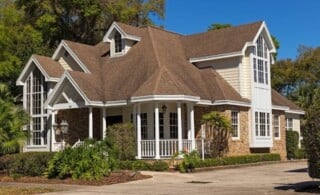 Why A New Roof May Cost You Zero Dollars (in the Long Run)
Why A New Roof May Cost You Zero Dollars (in the Long Run) 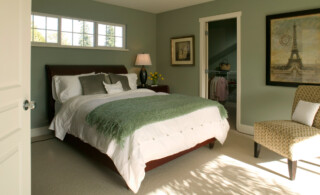 5 Steps to the Perfect Guest Room
5 Steps to the Perfect Guest Room 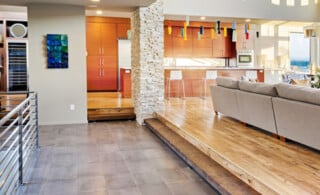 Find the Perfect Flooring: The Pros, Cons and Costs of Top Flooring Materials
Find the Perfect Flooring: The Pros, Cons and Costs of Top Flooring Materials 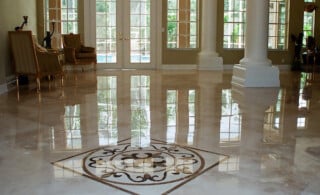 Marble Floors: Elegant but Not Exclusive
Marble Floors: Elegant but Not Exclusive 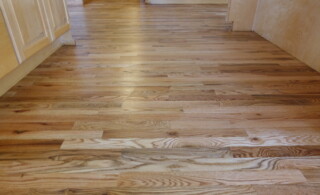 Oak Flooring: You Can’t Go Wrong, but You Can Be More Right
Oak Flooring: You Can’t Go Wrong, but You Can Be More Right 

Metal roof over porch. What can be done to keep acorns from loud banging on roof?